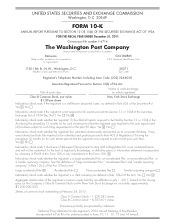Washington Post 2011 Annual Report Download - page 21
Download and view the complete annual report
Please find page 21 of the 2011 Washington Post annual report below. You can navigate through the pages in the report by either clicking on the pages listed below, or by using the keyword search tool below to find specific information within the annual report.Education Act by Congress will commence during the year 2013, but it is possible that Congress may make changes to
that statute or to other laws affecting U.S. Federal student aid before then.
Whether as a result of changes in the laws and regulations governing Title IV programs, a reduction in Title IV program
funding levels or a failure of schools within KHE to maintain eligibility to participate in Title IV programs, a material
reduction in the amount of Title IV financial assistance available to the students attending those schools could have a
material adverse effect on Kaplan’s business and operations. In addition, any development that has the effect of making
the terms on which Title IV financial assistance is made available materially less attractive could also have a material
adverse effect on Kaplan’s business and operations.
U.S. Senate Committee Review. In the summer of 2010, the Health, Education, Labor and Pension Committee
(the HELP Committee) of the U.S. Senate commenced an industry-wide review of for-profit higher education institutions.
The institutions owned and operated by KHE were included in the scope of this industry-wide review. To date, the HELP
Committee has conducted several hearings, and additional hearings may be scheduled, but are not anticipated.
The ultimate outcome of the hearings and implications to the operation of KHE’s institutions are presently unknown.
Other committees of Congress have also held hearings into, among other things, the standards and procedures of
accrediting agencies, credit hours and program length and the portion of U.S. Federal student financial aid going to
for-profit institutions. A number of legislators have variously requested the U.S. Government Accountability Office to review
and make recommendations regarding, among other things, student recruitment practices; educational quality; student
outcomes; the sufficiency of integrity safeguards against waste, fraud and abuse in Title IV programs; and the percentage
of proprietary institutions’ revenue coming from Title IV and other U.S. Federal funding sources. This increased activity may
result in legislation, further rulemaking affecting participation in Title IV programs and other governmental actions. In
addition, concerns generated by congressional or other activity, or media reports, may adversely affect enrollment in
for-profit educational institutions.
Program Reviews, Audits and Investigations. Kaplan’s schools are subject to audits or program compliance reviews
by various external agencies, including the DOE, its Office of the Inspector General and state and accrediting agencies.
While program reviews may be undertaken for a variety reasons, they are performed routinely as part of regulatory
oversight of institutions that participate in Title IV or state student funding programs. If the DOE or another regulatory
agency determines that an institution has improperly disbursed Title IV or state program funds or violated a provision of the
Higher Education Act or state law or regulations, the affected institution may be required to repay such funds to the DOE
or the appropriate state agency or lender and may be assessed an administrative fine and be subject to other sanctions.
Although Kaplan endeavors to comply with all U.S. Federal and state laws and regulations, Kaplan cannot guarantee that
its interpretation of the relevant rules will be upheld by the DOE or other agencies, or upon judicial review.
In September 2008, the DOE began a program review at KHE’s CHI-Broomall, PA campus. The DOE has delayed
issuing a final report on this review, pending the completion of a separate inquiry regarding the program from the U.S.
Attorney’s Office for the Eastern District of Pennsylvania. In July 2011, Kaplan resolved the inquiry with the U.S. Attorney’s
office, and therefore a final report on this review is expected soon. No assurance can be given that the DOE’s final report
will not have a significant adverse effect on Kaplan’s ability to continue to operate this school. See further discussion in
Item 3. Legal Proceedings.
The DOE also began a program review in October 2007 at KHE’s Pittsburgh, PA, location. Kaplan has responded to all
requests for information and is cooperating fully in this review. The DOE has not yet issued a final report on this review.
No assurance can be given that the DOE’s final report will not have a significant adverse effect on Kaplan’s ability to
continue to operate this school.
In September 2009, the DOE began a program review of Kaplan University at its offices in Fort Lauderdale, FL. Kaplan
University is continuing to respond to all requests for information and is cooperating fully in the review. The reviewers
completed their field work and are reviewing documentation already submitted. The DOE has not issued the final
program review report. No assurance can be given that the DOE’s final report will not have a significant adverse effect
on Kaplan’s ability to continue to operate this school.
The DOE conducted a program review at KHE’s Phoenix, AZ, campus in February 2011. The DOE issued its report on
October 27, 2011, indicating five minor findings that have de minimis financial or operational impact. The Phoenix
campus expects to be able to resolve these findings quickly and without difficulty.
The DOE conducted a program review at KHE’s Brooklyn, OH, campus in June 2011. On October 24, 2011, the DOE
issued an “expedited” final report, requiring no action on behalf of the Brooklyn, OH, campus.
2011 FORM 10-K 9
























